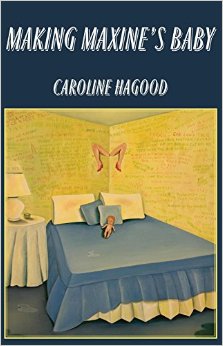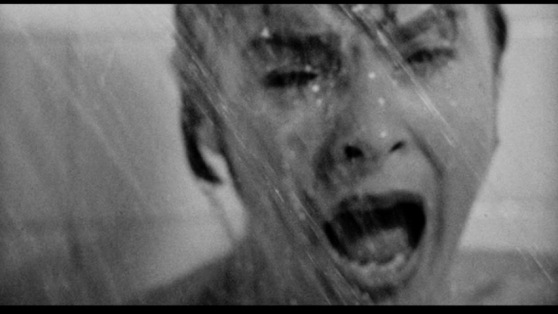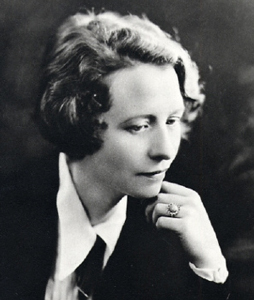I take what the world throws at me, and spin, twist, skim, fly, flip, throw it back – Selima Hill
Making Maxine’s Baby is Caroline Hagood‘s second collection of poetry. It follows her impressive debut, Lunatic Speaks and exaggerates, plays with, crystallizes that book’s themes and styles.
I don’t want to give too much away, because Making Maxine’s Baby is a story, a ‘narrative poem’, an urban fairy tale that it is best you discover for yourself. Maxine, the central character, is a homeless woman in New York. She is also symbolic of the writer, both the author of the book and the ‘Writer’ with a capital W.
‘Before they bludgeoned them
or left them to rot under a stack of TV dinners,
writers used to talk to muses,
but now she makes do shouting at manholes
and playing her harmonica
for the A train people’.
Hagood’s signature soup of vivid, surreal imagery, pop culture references and side-eyes to literary theory is served here with growing confidence and panache. In particular the author explores Horror as a way of representing simultaneously the harsher elements of Maxine’s experience, and her chosen form of imaginative escape route. In the poems entitled ‘Horror Theory’ She
‘dreams of standup comics
sliding dead down shower walls
making red capes on white tiles’.
As in Lunatic Speaks, the colour red recurs throughout the book as a motif.
‘Maxine is always wondering what colour
she is inside. Red probably…
not lipstick
but uncle’s bloodclot, not raspberry
but hooker’s nipple, gore on murder
weapon, color of his face when she said
he didn’t love him’.
The Horror genre is further evoked through descriptions of film scenes, quotes from famous directors and Maxine’s hobby of slipping, a little Travis Bickle like, into screenings of obscure horror flicks like ‘Onibaba, Ichi the Killer and Santa Sangre‘.
I tend to watch horror films through my hands, but Maxine stares them out.
‘All Maxine can think of is Sally’s tortured eyeball
in Texas Chainsaw Massacre when she puts her glasses on’.
The ‘theory’ in the ‘Horror Theory’ poems drags the reader out of the cinema and into the realms of psychoanalytic literary and cultural criticism. I particularly enjoyed Hagood’s down to earth yet poetic portrayal of the key concept by one of the more difficult-to-read scholars in the field:
‘After she read Julia Kristeva, she pictured abjection
as a man so lonely he makes a wife doll
out of household goods, with one ping-pong ball eye
to gaze at him, and a toilet paper hand’.
As well as Julia Kristeva, the wonderful work of Carol Clover was brought to my mind, particularly her treatise on gender in horror films, Men, Women and Chainsaws.
So Making Maxine’s Baby does not lead the reader into a Wordsworthian, ‘tranquil’ contemplation. The landscape of the book is definitely urban, noisy, distracting. Sleeping as she does on the street, Maxine ‘can’t be sure of anything’ when she wakes – ‘whose soft bruised limbs are these? Whose morning saliva?’ But she seems to thrive on the uncertainty, the promise of the city. ‘While walking the Brooklyn Bridge today, /she choked on something sacred’.
Hagood, a (New York) city girl herself, revels, via the character of Maxine, in the psychogeography of everyday urban life. An American Iain Sinclair perhaps, tracing the footsteps of an imaginary John Clare through underpasses, unlit streets and the grimy backs of restaurants, hoping to find freedom and inspiration in the dark.
‘Gertrude Stein understood the structure
of her writing when she saw her first Picasso.
Maxine pictures her psyche as a Lower East Side
tenement. Some days she wakes to find her body
become a suburb – how to navigate this town
so rich with bramble patches and Br’er Rabbits?’
I hear echoes as well from William Carlos Williams‘ Paterson where ‘a man in himself is a city’. And a woman, too?
Intellectually rigorous and poetically deft it may be, but what I like most about Making Maxine’s Baby, and Hagood’s poetry overall, is its undercurrent of silliness and joy. I laughed out loud a few times, reading the manuscript, and inwardly a few times more, thinking about some of my favourite lines later. (I won’t try and relive those moments here, you’ll just have to read, and laugh for yourself). Hagood manages to celebrate, respect and poke fun at the practice of writing, reading and studying literature (and other art forms) all at once. And the humour bounces off the seriousness of the work just right.
I hope Caroline Hagood makes us some more poem-babies soon!
———————————–
Making Maxine’s Baby is published by Brooklyn publishers Hanging Loose Press. Read more about Caroline Hagood here.












